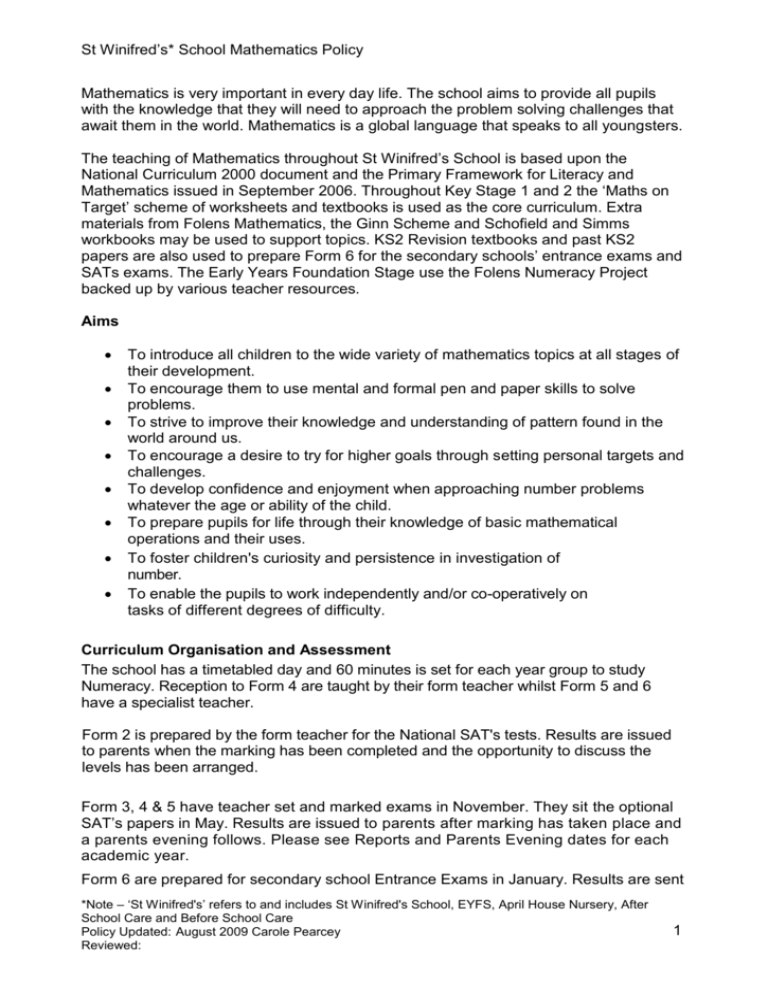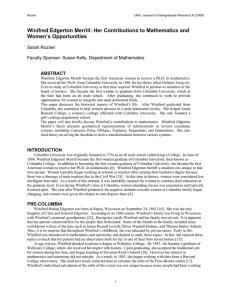Mathematics curriculum
advertisement

St Winifred’s* School Mathematics Policy Mathematics is very important in every day life. The school aims to provide all pupils with the knowledge that they will need to approach the problem solving challenges that await them in the world. Mathematics is a global language that speaks to all youngsters. The teaching of Mathematics throughout St Winifred’s School is based upon the National Curriculum 2000 document and the Primary Framework for Literacy and Mathematics issued in September 2006. Throughout Key Stage 1 and 2 the ‘Maths on Target’ scheme of worksheets and textbooks is used as the core curriculum. Extra materials from Folens Mathematics, the Ginn Scheme and Schofield and Simms workbooks may be used to support topics. KS2 Revision textbooks and past KS2 papers are also used to prepare Form 6 for the secondary schools’ entrance exams and SATs exams. The Early Years Foundation Stage use the Folens Numeracy Project backed up by various teacher resources. Aims To introduce all children to the wide variety of mathematics topics at all stages of their development. To encourage them to use mental and formal pen and paper skills to solve problems. To strive to improve their knowledge and understanding of pattern found in the world around us. To encourage a desire to try for higher goals through setting personal targets and challenges. To develop confidence and enjoyment when approaching number problems whatever the age or ability of the child. To prepare pupils for life through their knowledge of basic mathematical operations and their uses. To foster children's curiosity and persistence in investigation of number. To enable the pupils to work independently and/or co-operatively on tasks of different degrees of difficulty. Curriculum Organisation and Assessment The school has a timetabled day and 60 minutes is set for each year group to study Numeracy. Reception to Form 4 are taught by their form teacher whilst Form 5 and 6 have a specialist teacher. Form 2 is prepared by the form teacher for the National SAT's tests. Results are issued to parents when the marking has been completed and the opportunity to discuss the levels has been arranged. Form 3, 4 & 5 have teacher set and marked exams in November. They sit the optional SAT’s papers in May. Results are issued to parents after marking has taken place and a parents evening follows. Please see Reports and Parents Evening dates for each academic year. Form 6 are prepared for secondary school Entrance Exams in January. Results are sent *Note – ‘St Winifred's’ refers to and includes St Winifred's School, EYFS, April House Nursery, After School Care and Before School Care Policy Updated: August 2009 Carole Pearcey Reviewed: 1 St Winifred’s* School Mathematics Policy direct to parents by the schools. They also sit the Key Stage 2 SAT’s tests in May. The Papers are marked externally and parents informed of their child’s attainment by letter when the school receives the levels of attainment from the external exam board. Form 5 & 6 take part in the Mathematics Associations Primary Maths Challenge. Each child, whatever their attainment, receives a certificate to be awarded at Speech Day. Fostering Positive Attitudes to Mathematics The children are encouraged to work as a group during class lessons or with the teacher’s guidance this fosters co-operative work and helps to build their confidence within the subject. Independent work is also developed as their confidence builds. This prepares them for tests and examinations that form part of later learning. The natural curiosity of young children is used wherever possible to build number bonds and explore patterns, measure and shapes. Persistence with problem solving in real life situations and pure mathematical exercises is desirable. Gentle help and direction will enable the pupils to be self-motivated. Throughout the school games are used to encourage children to develop their mental skills and help them to achieve. Through this and a variety of board games all children can have fun within the subject. It is very important that all pupils can achieve recognition for their personal attainment. This is achieved by positive reinforcement; house points, Good Work Book signatures and commendations from their teachers. Much individual help is given to all the pupils throughout the school to enable them to achieve and dissolve barriers that can be formed where numbers are concerned. Resources Textbooks are used with the older pupils whilst work sheets are predominantly used for younger pupils. ICT resources are loaded in the classrooms and Library. The whole school has access to Folens ICT Primary Maths, Maths Sphere, Numbers Up 1 and 2. KS2 also uses BBC Number as well as a variety of resources accessed through the Internet. Equipment for measure, weight, capacity, shape, counting and many more are available in the classrooms or shared throughout the school or with the science department. Calculators are used for some topics and their use is taught to the children as part of the Primary Framework. The children have a list of equipment that is required as part of their uniform sent out each year in the Welcome Pack. This includes calculator, set square, protractor, ruler and compass. Spares are available in the classrooms. SEN Support By arrangement with the subject teacher, the SENCO or teaching assistant many sit within the class to support a pupil or group of pupils or withdraw a child or group for specific help. Individual education plans (IEP) are developed between the subject teacher and SENCO for any child who is recognised as in need. High attainers are encouraged to expand their knowledge through extra tasks set to stretch their logic and problem solving skills. All coursework is differentiated to cater for the individual needs of each child. *Note – ‘St Winifred's’ refers to and includes St Winifred's School, EYFS, April House Nursery, After School Care and Before School Care Policy Updated: August 2009 Carole Pearcey Reviewed: 2 St Winifred’s* School Mathematics Policy Mental Mathematics Mental imagery is encouraged throughout the school. The teaching of strategies to develop these skills is taught with the use of number squares, lines, fingers, tricks as well as class discussion about other children’s methods. Games to support number and tables bonds are played using white boards and number cards. Heinemann Rapid Recall and Mental Arithmetic weekly test papers are used through out the school to focus the strategies that are being developed within lessons. Form 3, 4, 5 & 6 also use taped tests like the optional and actual SAT’s papers mental test. Multiplication tables are learnt from Form 2 and regular testing is used to focus the start of lessons in Form 3, 4, 5 & 6. Written Work Children are encouraged to use the skills they have acquired to record their responses to problems. This will differ according to their understanding of mental strategies and confidence with their use. Pupils work is recorded on worksheets in folders in Reception to Form 2. The children also have books for extra reinforcement work and homework. The children use pencil for their work so teachers can discuss answers and correction can be made. Form 3 to 6 use exercise books to record their work. The use of ink pens for formal written work is expected. Development of Mathematical Language Classes have access to mathematical dictionaries and are encouraged to use their knowledge of mathematical words when discussing problems and answering questions. Many lessons involve oral work where vocabulary can be extended and developed. Homework Mathematics homework is set for Forms 3 to 6 twice a week. The amount depends upon the age of the children. They are encouraged to work for the designated time. This may mean an exercise is not completed. The important element is that the child adopts the good habits of doing homework to the best of their ability. What one finds easy another may find hard so work at a different rate. Consideration of this is needed when setting homework. Practice learning tables is also encouraged daily from Form 2 Parents’ Support and Help Parents are encouraged to help their children with homework and learning their tables. This abstract concept needs explanation and another slant on the work can be helpful. Parents are also encouraged to speak to teachers on parents evenings or by appointment in the term time to liase about help they wish to give their child. Marking Marking, whenever possible, or especially with younger children, is done with the child. This allows errors to be corrected instantly, possible strategies to be discussed and positive reinforcement to be given as the work is being done. House points and Good Work Book signatures are excellent commendations for work. *Note – ‘St Winifred's’ refers to and includes St Winifred's School, EYFS, April House Nursery, After School Care and Before School Care Policy Updated: August 2009 Carole Pearcey Reviewed: 3 St Winifred’s* School Mathematics Policy Positive and helpful comments written on older children’s work can also bring lasting results. Personal targets set with the child’s agreement can also help to foster their approach to the subject. Grades In Forms 3, 4, 5 and 6, grades are put at the end of work to show accuracy in calculations. A = all correct, A- = one question wrong, B+ = two questions wrong, etc. Grades on reports reflect National Curriculum levels achieved in the case of exams, or calculated by continuous teacher assessment. Comments need to be encouraging and constructive. Equal Opportunities All children are given the opportunity to develop their understanding. There is help provided for children with specific learning difficulties from the SENCO or teaching assistant and differentiated exercises within the classroom. Children learning English as a second language are helped with the mathematical terms and asked to share their methods of performing operations to solve problems. Sometimes parental help is needed to translate mathematical language or changes in the order of facts. The time can cause problems here as different cultures start with minutes instead of hours: 3: 45am / Quarter to 4. In Form 6 the Level 3 or below group is targeted in preparation for the SAT’s tests. Extra support is given to help them focus on topics they need to achieve Level 4 Overall Aims • To equip the children with the sound basic skills in Mathematics that will help them in their future lives. • To foster an interest and enjoyment of Mathematics. For a detailed list of ‘what most children learn’ in each academic year, go to nationalstrategies.standard.dcsf.gov.uk/node/48369. The document can be downloaded. Alternatively, follow the right hand menu to Primary Framework for mathematics learning objectives. Select year and strand (one of the seven areas of learning). *Note – ‘St Winifred's’ refers to and includes St Winifred's School, EYFS, April House Nursery, After School Care and Before School Care Policy Updated: August 2009 Carole Pearcey Reviewed: 4






